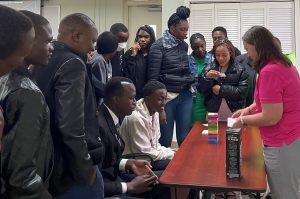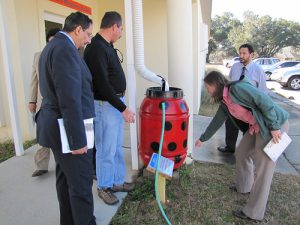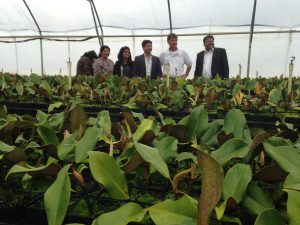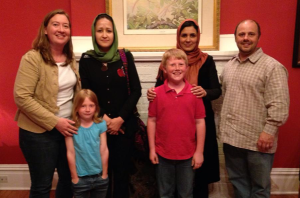
Yesterday, I laughed as a group of teenagers from France, Martinique, Guadeloupe, and the United States formed a rolling conga line using the office chairs in my meeting room. They giggled as they sped around the room bumping into tables and each other. They had just listened thoughtfully to my presentation on environmental and climate issues in the Pensacola area, and afterwards packed themselves into my building’s tornado shelter to take selfies.
Three months ago, a dozen teenagers from three African nations were in the same building, teasing and cheering each other as they played a climate-themed Jenga game. In March, I joined several local colleagues on a panel to talk with six women from Latvia about stormwater, sea level rise, and educational outreach.

How did all of these people end up in Pensacola? Well, they were participants in the U.S. State Department’s International Visitor Leadership Program. Connected to the IVLP is our local Gulf Coast Citizen Diplomacy Council (GCCDC), a non-partisan, non-profit 501(c)(3) organization whose mission is “to create and encourage collaboration between like-minded community stakeholders who value sharing the Central Gulf Coast with the rest of the world.” This local organization brings in international visitors on a monthly basis to learn about the Gulf Coast or areas of interest to their home countries. Often, Diplomacy Council staff request Extension Agents’ assistance in leading tours or speaking about subject matter expertise. Discussions have included environmental protection and education programs, democracy and civic involvement, sustainable rural development, ecotourism, 4-H programming, and the role of women in science and education. While in town, delegations visit with many other local businesses, government representatives, non-profit organizations, and more. During their time in the States, most international groups also visit Washington, D.C. and 2-3 other cities.

The visitors, themselves, typically come with very impressive resumes. They are often leaders, holding elected or influential office in their local or national government, running businesses or non-profits, or working in research. High school students are often selected based on their academic performance, community involvement, and areas of interest (like environmental science or agriculture).
I love to travel. Once I make it to five more, I will reach my goal of visiting all 50 American states. I’ve traveled internationally several times and plan in the next few years to go overseas again. But working full time and raising a family, there is no way that I could have made connections with people from Algeria, Azerbaijan, Bangladesh, Belize, Burkina Faso, Cambodia, China, Columbia, Cuba, El Salvador, Fiji, France, Hungary, Iraq, Kuwait, Latvia, Lebanon, Malawi, Morocco, Mozambique, Nepal, Nigeria, the Palestinian territory, Saudi Arabia, Uganda, and Vietnam by visiting all of those places. The beauty of the local Diplomacy Council is that they bring the world to us, creating opportunities to exchange ideas, learn from each other’s experiences, and share meals and customs.

I am reminded each time a delegation visits that we really have more in common with people from other nations than we have differences. Being thousands of miles away from all but our border countries, it is easy to make up and believe imaginary narratives about what “they” and “those people” do and believe. It’s a lot harder to believe many of those things up close. Teenagers are the same everywhere—they want to explore, play, learn, ask big questions, and text their friends. Adults focus on safe places to live, good education systems, productive economies, healthy food, and clean water.
As Mark Twain once said so eloquently, “Travel is fatal to prejudice, bigotry, and narrow-mindedness, and many of our people need it sorely on these accounts. Broad, wholesome, charitable views of men and things cannot be acquired by vegetating in one little corner of the earth all one’s lifetime.” Or maybe you can—if you have a Diplomacy Council group bringing the earth to your little corner!
 7
7
